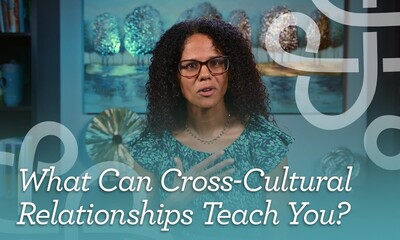The Hidden “Software” Running Every Relationship

My graduate work in the field of Intercultural Studies gave me a chance to interview some amazing couples. Stacy is Jewish from Chicago. Daryl is African American from Los Angeles. We had an eye-opening cross-cultural experience when I discovered their different views of their family dogs.
Stacy’s puppy had a name like she was a family member. She ate meals at their table and slept in Stacy’s bed. Daryl’s dog, on the other hand, was mainly responsible for keeping the household safe. He slept tethered outside, ate scraps, and fulfilled the purpose of the sign in the front yard: “Beware of the Dog.” Stacy’s pup was the family fur baby. That made Daryl wince. Those are typical of what we call cultural differences.
All culture is learned. It is personal, and it’s unique to each of us. At times, we use the same words, but as I’ve heard John Stonestreet say, we might get our meaning from different dictionaries. Sometimes we talk about our cultural preferences as if they are universal truths—as if “everyone ought to think the same way I do.” We need to keep in mind that what we communicate might be personally meaningful to us, but our words might not be understood in the way we intend.
How often do you recognize the impact of your personal culture on your relationships? I’m pretty sure that most of us think of culture as external things that shape our context—like movies, social media, books, music, and stories. True, those are influences that affect us. But I’m referring to culture as a hidden dimension shaping our perspectives within our lives.
Here’s what I mean. Dutch cultural anthropologist Geert Hofstede came up with the idea that culture is the “software of the mind.” He likened it to a personal operating system, like in a computer, that is functioning within each of us. Our personal cultural software is unique to each of us.
People from the same ethnic or national backgrounds might be influenced to see the world within similar cultural contexts. But on the personal level, our cultural operating systems are unique. That’s even true for twins born into the same family! That’s because all culture is learned and acquired through a lifetime of experiences. For example, four members in the same family can have entirely different responses to a pet—like a dog—based on their unique life experiences.
All communication is cross-cultural. That’s because it is interpersonal, and meaning is as much about what is heard as what was originally said. Each of us has our own personal cultural operating system functioning all the time. So, it is common—and even natural—for all of us to think that everyone else has the same set of cultural values as ours. We usually don’t, and that’s where cross-cultural challenges emerge.
Have you ever had a conversation like that when someone says the word “Christian,” and it doesn’t have the same familiar vibe you’re used to? You might understand the word in the context of your church community, beliefs, and practices like Bible reading and prayer. But for the other person, there is a weirdly different association. I was the cultural outsider who grew up in a traditionally Jewish synagogue experience. In our viewpoint, the term Christian was used to simply refer to a non-Jew or a “Gentile.” The definition “a follower of the Messiah” was not in our dictionary!
If you only know your own culture, you’ll probably experience lots of challenges in your relationships. How well do you understand your own culture? Are you aware of the experiences that have created your cultural software? Whether you’re just getting to know another person or you’ve been married awhile, discussions that explore your cross-cultural differences can unearth treasures of deeper understanding about your partner.
Just something to think about… not a sermon.
Use these questions to guide conversation with your spouse, small group, or friends. The goal isn’t to find “right” answers but to deepen understanding and connection through curiosity and honest reflection.
How have your upbringing and life experiences shaped the “cultural software” you bring into your relationships?
What are some examples of values, habits, or communication styles that feel “normal” to you but might be different for someone else?Can you think of a time when you and someone you love used the same word but meant completely different things?
How did that misunderstanding affect your relationship, and what could have helped bridge that gap?In what ways can becoming more aware of your personal culture strengthen empathy and connection in your relationships?
How can curiosity and humility help you learn from the differences instead of being frustrated by them?


